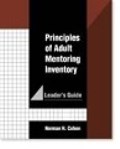PRINCIPLES OF ADULT MENTORING

by Dr. Norman H. Cohen
Many professionals who serve as mentors often have inadequate preparation for the realities of the mentoring task, which can lead to breakdowns in even the most committed mentor/mentee relationship. The Principles of Adult Mentoring Inventory allows mentors to take stock of their current strengths and development needs, and prepares them for their role in the mentoring process.
This assessment provides mentors with an objective means of assessing their mentoring skills, especially those behavioral competencies that are essential for productive interaction with a diverse group of mentees. The scale measures six distinct and important components of the adult mentoring relationship, which together constitute the complete mentor role.
Measures Six Mentor Functions:
- Relationship emphasis: Establishing a climate of trust in which mentees feel comfortable communicating
- Information emphasis: Offering tailored advice based on the mentee's current plans and goals
- Facilitative focus: Encouraging the mentee to consider alternative views and options
- Confrontational focus: Challenging the mentee to examine any unproductive strategies or behaviors
- Mentor model: Motivating the mentee to take necessary risks
- Mentee vision: Encouraging the mentee to take initiative and become an independent learner
A comprehensive Leader's Guide includes information on using the scores as a starting point for developing mentoring skills, as well as guidelines for conducting an effective mentor training program. Background material on scale design and reliability is also included. Another important training tool based on the six principles of mentoring - the Mentor Critique Form - is also available for group training sessions. This useful tool allows mentors to obtain peer feedback on their mentoring skills during role-play sessions.